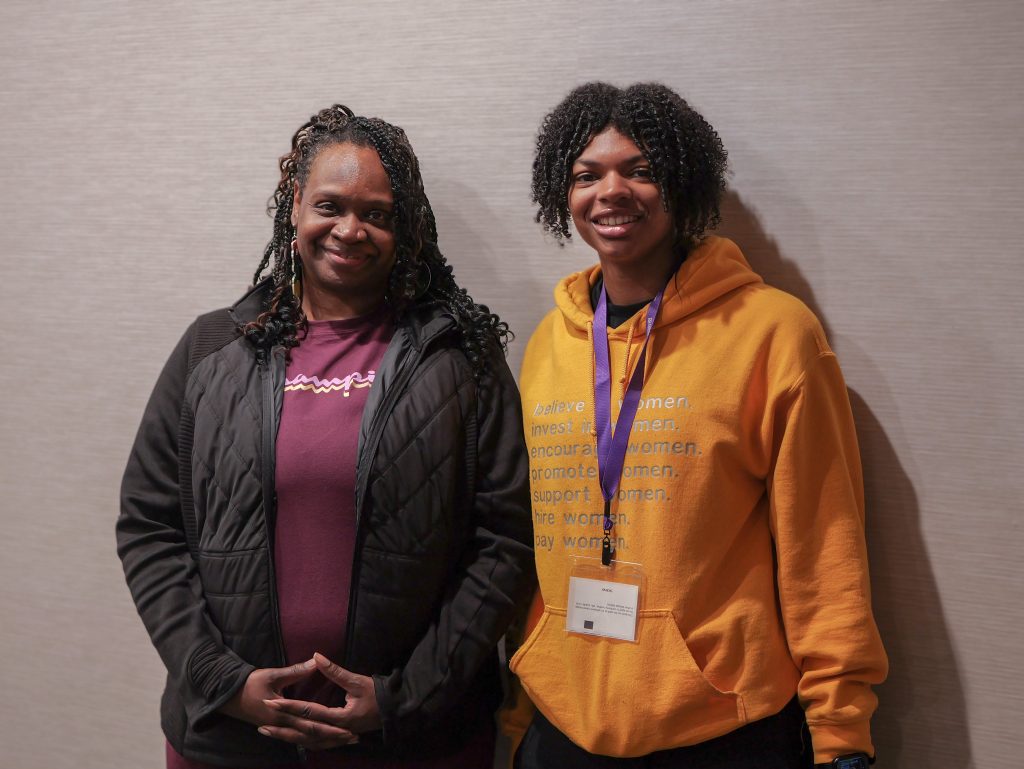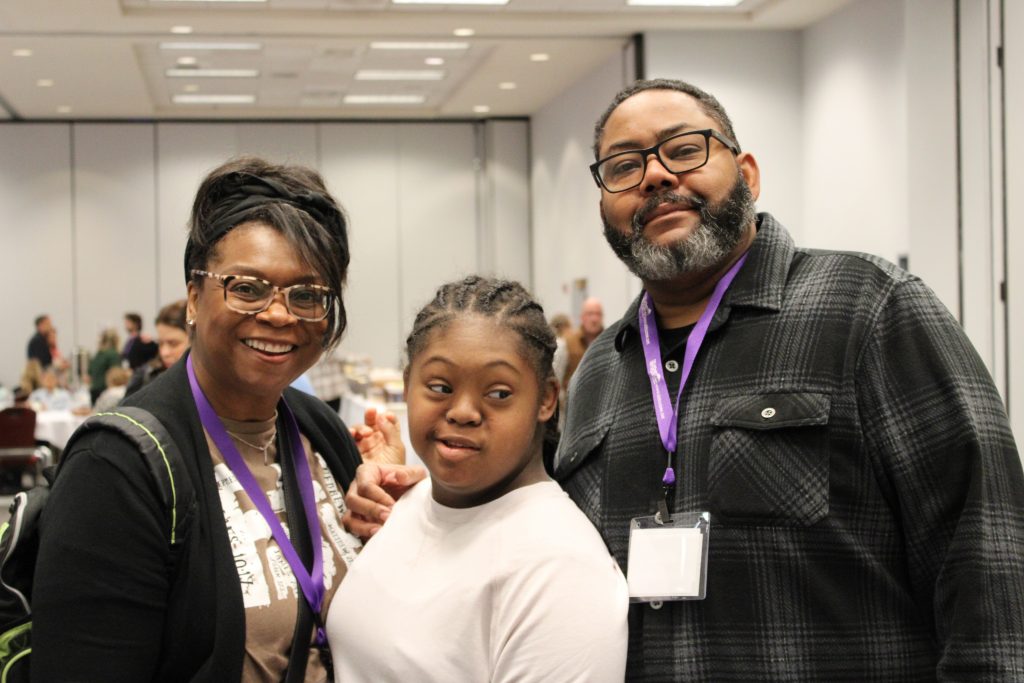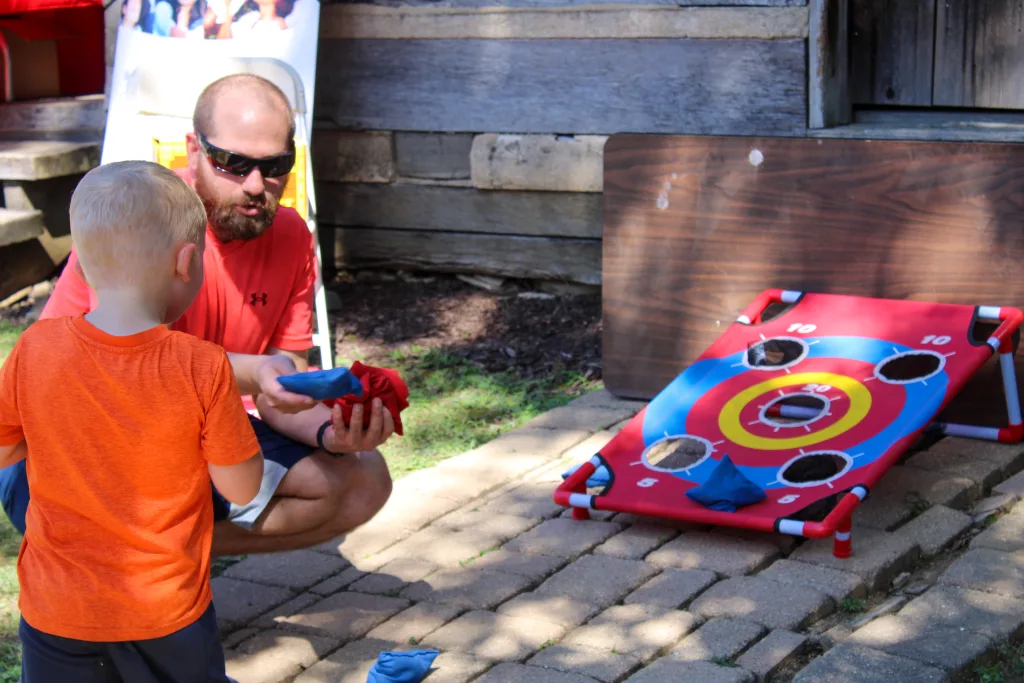Illinois Statewide Transition Conference Celebrates 20 Years of Empowering Youth on the Journey to Adulthood
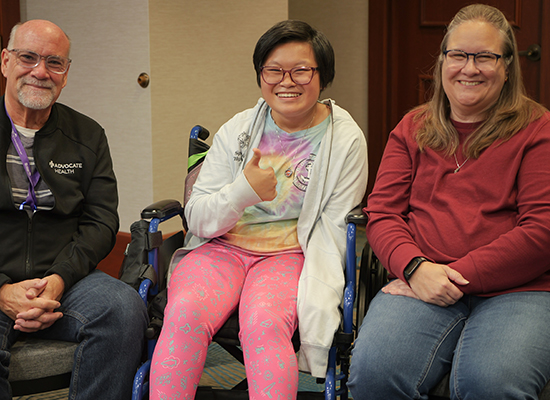
About 400 youth, family members and professionals gained valuable information, resources and connections to help prepare for adulthood at the 2025 conference in Springfield
The 2025 Illinois Statewide Transition Conference was more than just an informative event for 17-year-old attendee Aliyah.
The conference helped reframe how she thinks about her disability, her sense of self and what’s possible for her future.
“I think the most important takeaway from this whole thing is just finding the courage to say, ‘Hey, this is me, and I’m not ashamed of it anymore,’” Aliyah said.
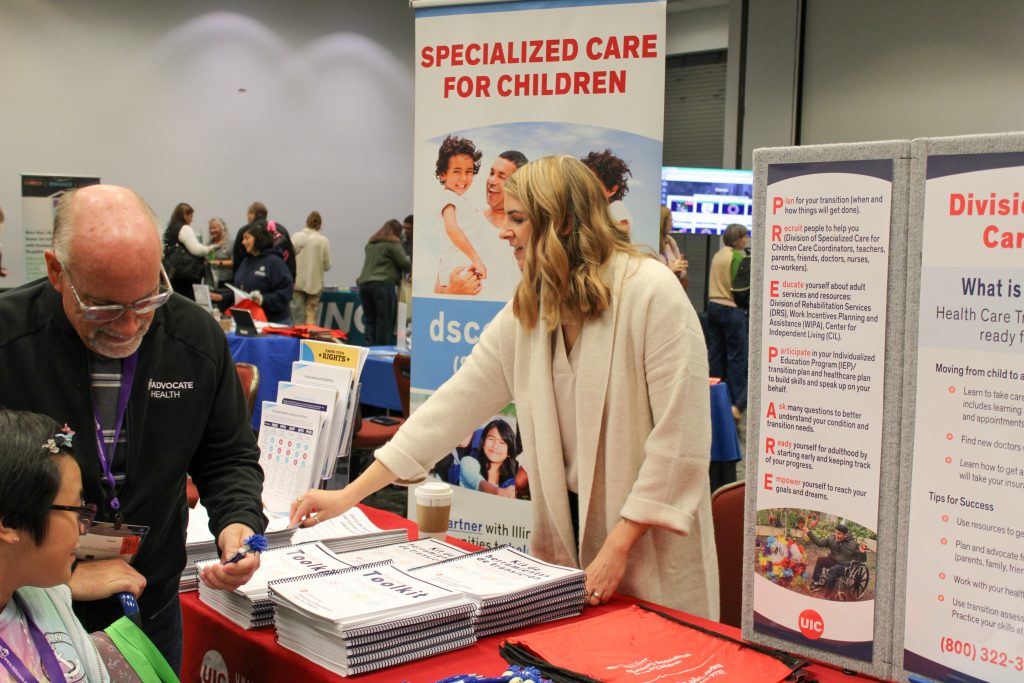
Aliyah has cerebral palsy and is a Division of Specialized Care for Children (DSCC) participant. She loves art and being creative. She is also a Special Olympics athlete with three gold medals in track and two in bowling. Her dream is to be a daycare worker or babysitter.
Aliyah and her parents, Dawn and Steve, traveled from Carbondale to attend the 20th annual Illinois Statewide Transition Conference in Springfield. It took place Oct. 30-31, 2025, at the Crowne Plaza Hotel and Convention Center.
More than 400 people from across the state attended, including youth with disabilities, parents, caregivers, vocational professionals, healthcare professionals and more.
“The transition conference is really a way for professionals and families to get together to learn about all the areas of the transition to adulthood,” said Claire Cook, DSCC’s Title V Transition Specialist and co-chair of the transition conference’s steering committee.
“You learn from self-advocates and learn about independence, healthcare transition, guardianship and alternatives, education — all the different areas that you need to learn about as you become an adult.”
DSCC helps sponsor the conference and serves on its steering committee. We also provide financial support to help our participant families attend the conference.
“Don’t let your limits hold you back”
Aliyah and her parents were among 21 DSCC participant families who attended the 2025 conference. They took part in a busy schedule of presentations and workshops.
“Today’s been exhausting, but also exciting because it’s like my future and what the future holds for me,” Aliyah shared after the conference’s first day.
Before coming to the conference, Aliyah didn’t enjoy planning for the future.
“I was scared about it. I was scared of my future, and also, I didn’t want anything to change. I’m not good with change at all,” she said.
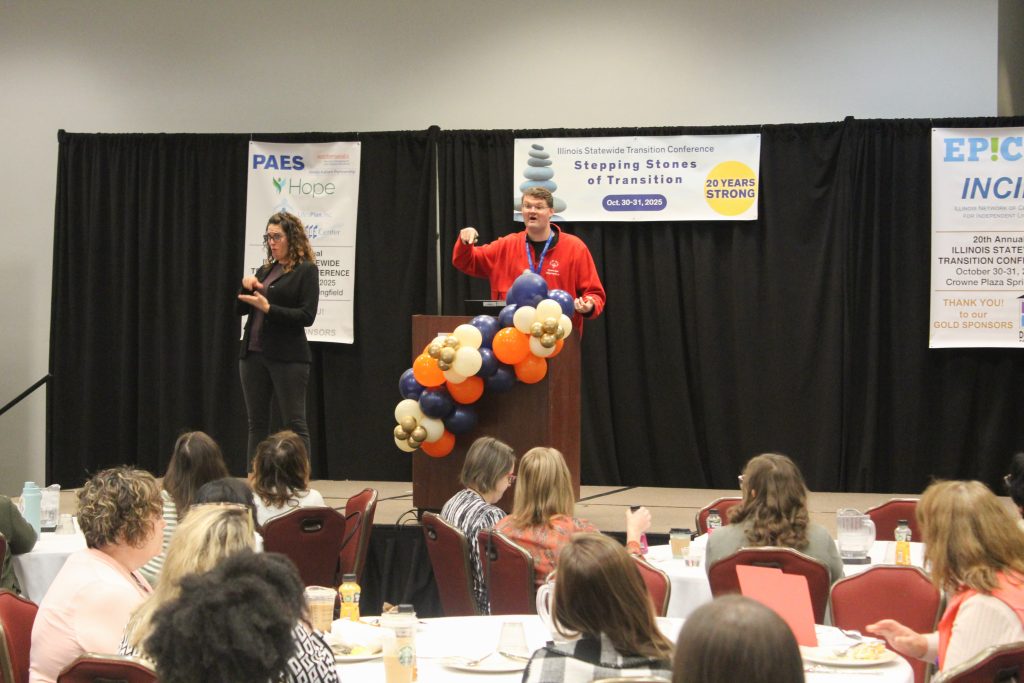
“The first speaker we saw, (keynote presenter) Taylor (Sweeting), he relates a lot to me because he felt like he was an outsider and didn’t belong here, and he hated his disability, and I hated my disability for a long time. I didn’t want anything to do with it or even talk about it.”
By attending sessions with self-advocates and connecting with a strong community of other individuals with disabilities, Aliyah began to view her future in a new way.
“Honestly, I like to see people that are going through things I’m going (through), that people are just like me,” she said.
Now, Aliyah offers powerful advice to other teens and young adults with disabilities.
“Don’t let your limits hold you back. If you have a dream, don’t let your disability or whatever you have hold you back from your dream,” she said.
TaLeah is another DSCC participant with big dreams.
The 18-year-old from Kankakee, Ill., first attended the transition conference in 2024. Since then, TaLeah has achieved her goal of attending college and playing basketball. She’s now working hard to eventually play basketball professionally.
As a returning conference attendee, TaLeah recommends the conference to other young adults with disabilities.
“Any type of disability, you should come here because they give you a lot, a lot of information,” she said.
“I was a little nervous at first. But I’m like, OK, you know what, I’m going to go ahead and check it out, see what’s going on. And then I felt like, OK, this conference can kind of help with information about disability. I feel good right now.”
TaLeah and her mom, Tamara, found out about the Transition Conference through DSCC.
TaLeah first enrolled with DSCC 16 years ago when she was diagnosed with hearing loss.
“We’ve been there since she was 2 or 3. I can’t believe all this time has gone by already. Throughout the years, they’ve been very supportive. They’ve been very helpful with medical expenses, equipment, appointments, resources. They can refer you here, refer you there. It’s very helpful,” said Tamara.
“Independent in her own space”
DSCC parent Todd attended the conference alone in 2023 and 2024. He and his wife, Michelle, said they were grateful they could both attend the 2025 event with their daughter, Taylor.
Taylor, 18, has Down syndrome and mild to moderate hearing loss. She loves art, taking care of animals, and most of all, her dog, Lulu.
“I would say that the past two years attending this conference, I gained so much information, I could have even benefited by going a year prior to that,” said Todd.
“It was a lot building up to her turning 18 that we felt like we had to get done, and I think we were able to get a lot of information. We set up an ABLE account. We obtained guardianship, applied for Social Security, and I think all of that we were able to do from the information and the knowledge that we got from this conference.”
Participating in the conference as a family helped them attend more sessions and gather twice as much information for Taylor. Now that Taylor has reached the age of adulthood, they have many hopes for what her next chapter will look like.
“The way that I see her future is Taylor independent in her own space with her own friends. Her days are meaningful, filled with doing what she loves, work or if that’s continued education. That’s the way that I see her future – happy, safe and living her best life,” said Michelle.
A powerful ripple effect
Michelle said she recommends the conference not only to other families but also to educators who teach youth with disabilities.
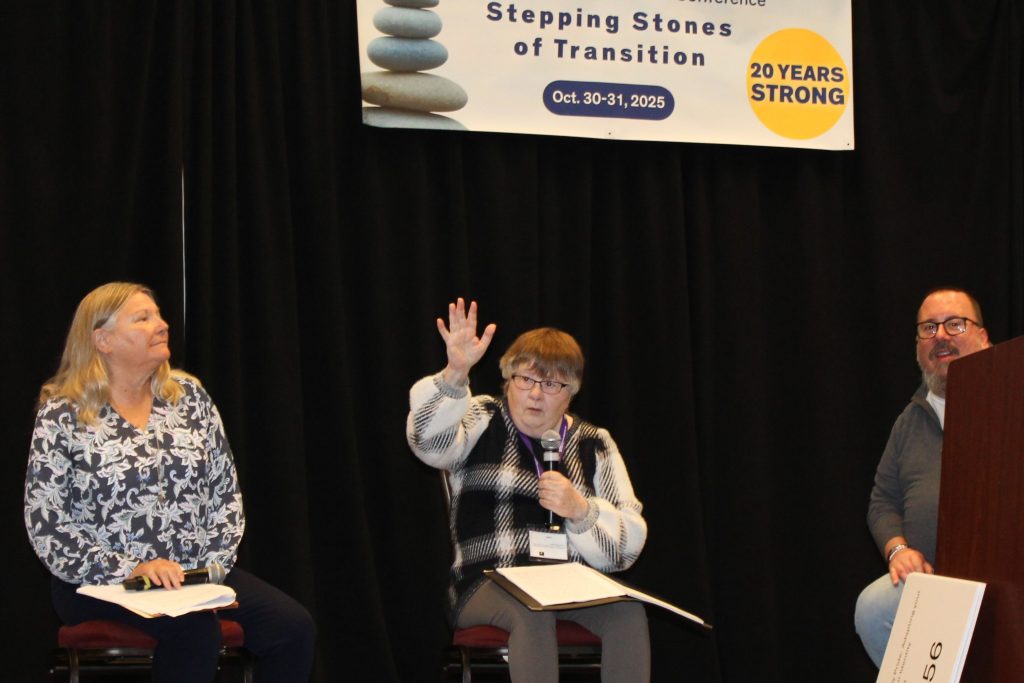
Conference Co-Chair Claire agreed that the transition conference offers a wealth of information for professionals that can have a powerful ripple effect.
“I really love the fact that these professionals can take it back to their communities and really spread it out to where they may have been the only one that attended, but hundreds of families learn from it,” Claire said
DSCC Care Coordinator Gabrielle Paskevicz attended the 2025 conference for the first time. She said she wanted to strengthen her knowledge and gain resources to help her participant families better navigate the challenges involved with moving to adult systems.
“It’s always a learning experience. I don’t care if you’ve been a professional for one year or 25 years. There’s new information, and it’s always evolving, and it’s important for us as professionals to be up to date with everything that’s going on,” she said.
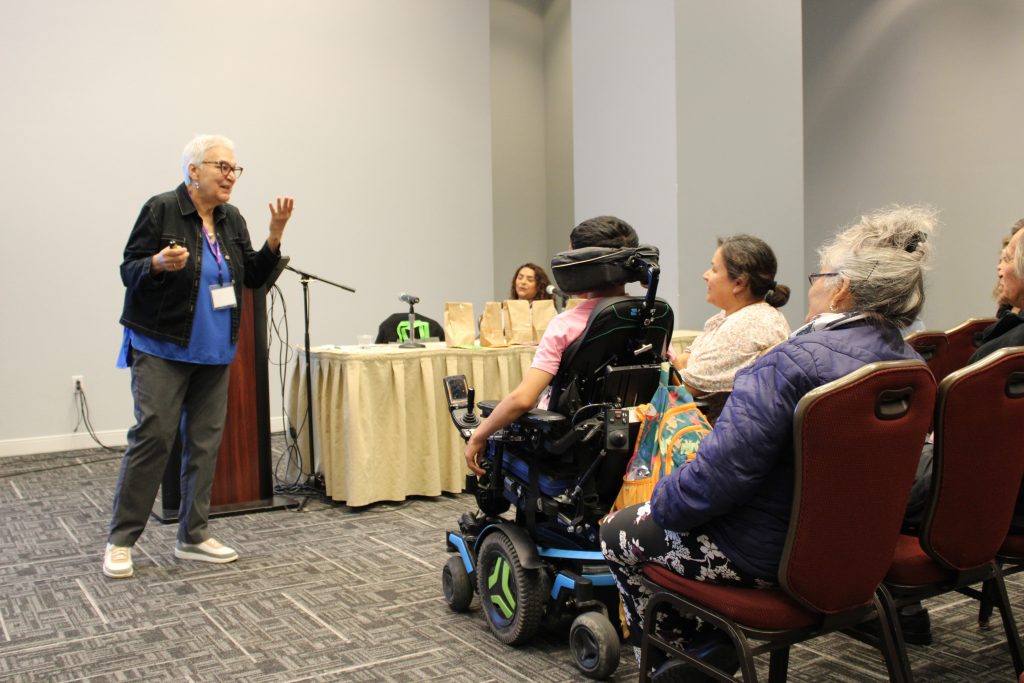
“I am very thankful that I was able to talk with some doctors that are actually some of my current participants’ doctors and be able to talk as professionals and just let them know the barriers that I’m hearing from my families and how to communicate with them… and how can we work towards their goals and make their transition process easier.”
The 2026 Illinois Statewide Transition Conference will take place on Nov. 5-6, 2026, at the Sheraton Lisle Naperville Hotel in Lisle, Ill.
To learn more about how to support youth with special healthcare needs during the transition to adulthood, contact DSCC at (800) 322-3722 or dscc@uic.edu.
For more information about the transition conference, visit www.illinoistransitionconference.org/.
Learn more about the annual conference, including highlights from DSCC participants, families and team members, in the video below.
You can also check out our Facebook page to see a photo album with more photos from the 2025 transition conference.
Our 2026 Annual Family Survey Is Coming!

DSCC participant families, please be on the lookout for our annual family survey on Feb. 10.
Participant families, we want to hear from you!
Our annual family survey is coming soon, and your feedback helps us better support children, youth and families like yours. You’ll also have the chance to win a gift card.
All Division of Specialized Care for Children (DSCC) participants will receive the survey starting Feb. 10. You’ll receive the survey by email or mail, based on your preferences.
Quick, Easy and a Chance to Win
- The survey takes less than 10 minutes to complete.
- Filling it out is optional and will not affect your services.
- If you respond, you could win one of five $50 Amazon gift cards.*
The survey asks about your experiences with DSCC, including how well our team supports your family and meets your needs.
How Your Feedback Makes a Difference
Your voice leads to real change. This short video shares what families told us during last year’s survey and how we’re using that input to make improvements:
Based on family feedback from last year’s survey:
- We are developing a customer service training for DSCC teams to strengthen our partnership with families. The training will focus on:
- Communication
- Teamwork
- Sensitivity to the needs of children and youth with special healthcare needs
- Response times
- We are also expanding our education and resource efforts to help families feel more informed, connected and supported through proactive care coordination.
You can learn more about how we use family feedback on our Family Surveys page.
Please be on the lookout for our annual survey on Feb. 10.
If you have questions or need more information, please contact your Care Coordinator.
We appreciate your partnership and look forward to hearing from you!
*Please note: Foreign national nonresident aliens are not eligible for the gift card participation prize.
Information Technology Support Associate Earns DSCC’s 2025 Award of Merit
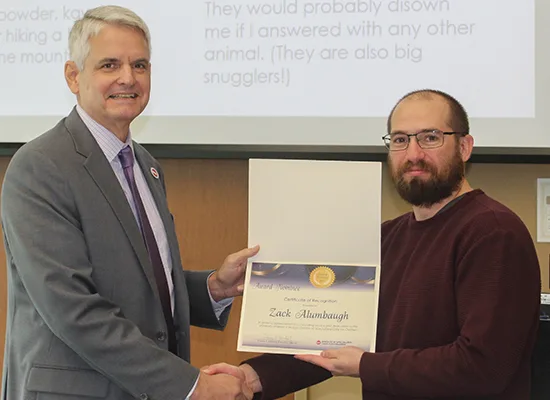
DSCC honors Zack Alumbaugh for his outstanding customer service, collaboration and dedication to serving Illinois children and families
Information Technology Support Associate Zack Alumbaugh is the 2025 recipient of the Award of Merit from the University of Illinois Chicago’s Division of Specialized Care for Children (DSCC).
The award recognizes exceptional DSCC employees for outstanding dedication and service to Illinois children with special healthcare needs and their families.
Zack joined the DSCC Information Technology (IT) team in 2020 and is based in our Central Administrative Office (CAO) in Springfield. His can-do attitude, dedication to resolving a wide range of IT challenges and kindness have made an impact in Springfield and beyond.
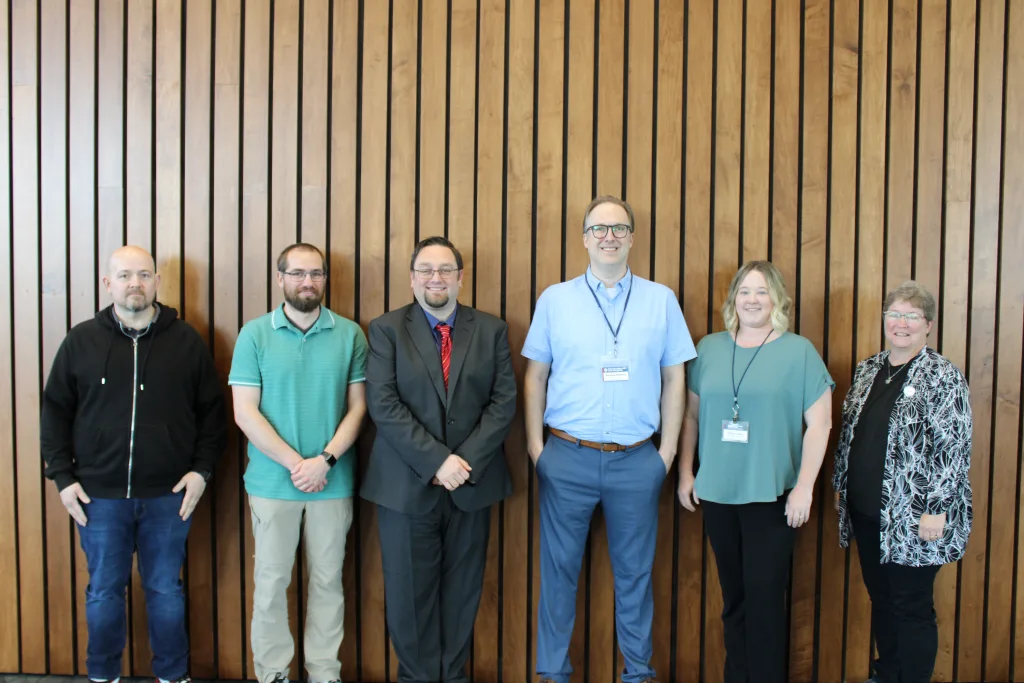
“Zack brings unwavering patience, creative problem-solving and genuine empathy to every interaction and challenge he faces,” DSCC Executive Director Thomas F. Jerkovitz said.
“His expertise and caring attitude have benefited every department at DSCC and given our team members the reliable support they need to best serve our participants. He understands the importance of DSCC’s mission and continually finds new opportunities to improve processes that, in turn, improve outcomes and services for families.”
Zack said he considers his role at DSCC to be much more than a job.
“What we do matters. We help participants and their families get access to assistance and care that makes a difference in their lives. DSCC is a shining example of the way a society can come together to care for each other and improve lives,” he said.
DSCC managers and colleagues nominated Zack for the award. They praise his outstanding contributions to the IT team, exceptional customer service and ability to resolve a wide range of technical issues with patience, professionalism and warmth.
“Zack skillfully bridges the gap between technology and the people who rely on it, demonstrating an extraordinary ability to anticipate needs and deliver clear, effective solutions. His remarkable capacity for communication has established him as a trusted resource across multiple departments, making him a linchpin in our organization,” said Andrew Nichols, Director of Information Systems, Security, and Compliance.
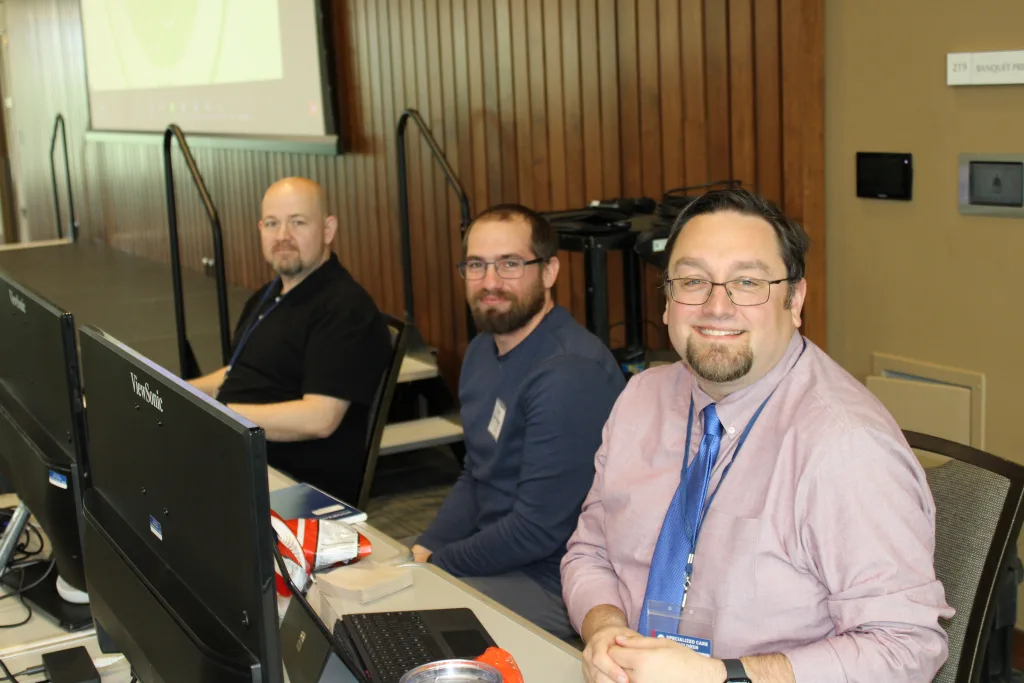
Whether the project is public-facing or behind the scenes, Assistant Director of Operations for Information Technology Greg Mayes says Zack’s combination of technical ability and exemplary customer service shines through.
“Zack’s incredibly intelligent with a great sense of humor and has a calming presence that puts everyone at ease,” Greg said.
Lombard Core Assistant Regional Manager Celestine Gatson couldn’t agree more.
“Zack’s work always, always, always exemplifies our mission. He’s always willing to be helpful,” Celestine said.
IT Training and Development Specialist Lynda Miller appreciates the many ways Zack “pours his heart into his work.”
“He never gives up on tough issues. He always follows through, and staff tell me how much they appreciate his support and his kindness,” Lynda continued. “Zack exemplifies our mission by collaborating with others, offering dependable support and building strong, trusting relationships across the team.”
Zack also enjoys spreading awareness about DSCC’s programs. He has supported key community outreach events, including the annual Illinois Statewide Transition Conference and the Sensory Station at the Illinois State Fair.
“At events, like the transition conference or other in-person meetings, he is quick to help and understands the importance of the work we do at DSCC. He works hard to ensure that things run smoothly and is willing to help in any way possible to ensure that everyone has a great experience,” said Benefits Management and Data Analytics Manager Brittani Provost.
Springfield and St. Clair Assistant Regional Manager Kathy Thomas praises Zack’s ability to get to the root of an issue and see it through.
“I have also seen him help at the Illinois State Fair. He gets out and talks with the families, playing games with the kids. It is great to see him out there promoting DSCC,” she said.
Zack joined DSCC at the encouragement of his mother, Stephanie Alumbaugh. Stephanie has worked at DSCC for over 20 years and received the Award of Merit herself in 2011 through UIC.
Zack calls this honor a “full-circle moment” for his family. He says he couldn’t be more thankful for the opportunity to work at DSCC and “get to do stuff with tech every day.”
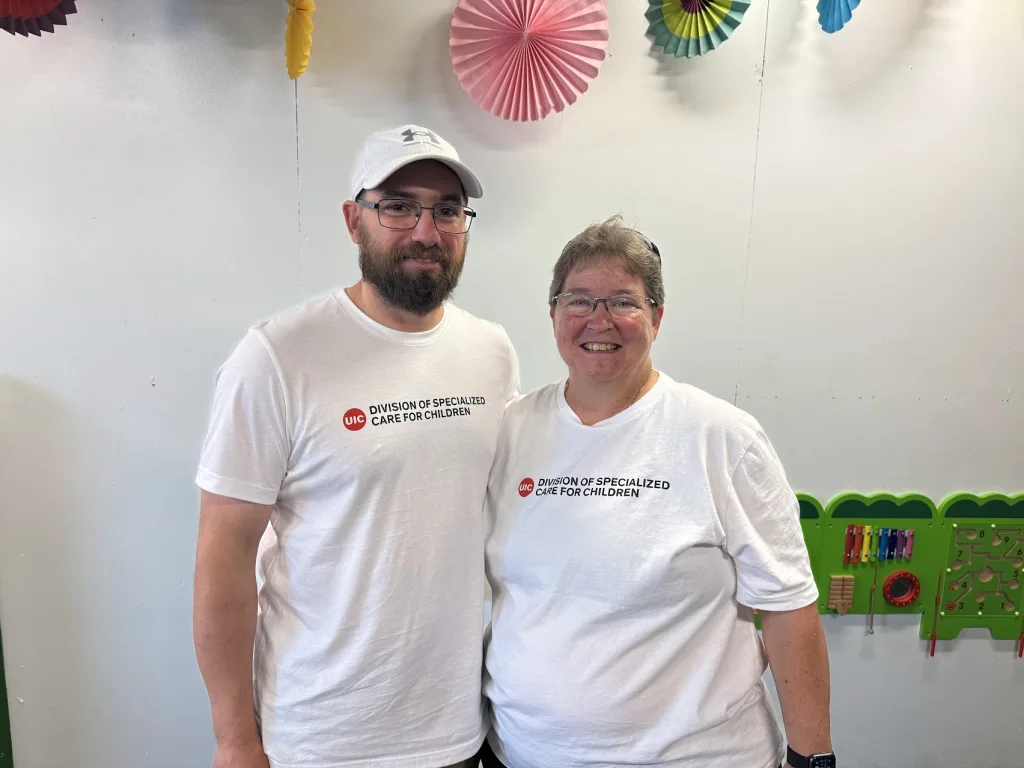
“I really enjoy getting to help people and maybe teaching them a little bit about how the computer works. It’s just really satisfying for me,” Zack added.
Zack also appreciates how DSCC supports his continued growth and professional development. He’s currently pursuing his master’s degree in Management Information Systems.
Zack says he’s proud to play a role in supporting DSCC participants and their families.
“Knowing what DSCC does…even if you’re having a rough day professionally, that really puts everything in perspective,” Zack said. “I don’t know what else somebody could ask for in a job. We get to help people every day.”
Learn more about Zack and his impact on DSCC in this short video:
DSCC staff nominated a total of 11 of their colleagues for this year’s Award of Merit. As the winner, Zack will receive a memento, a $2,500 award and recognition from the Executive Director.
Congratulations to all of our outstanding 2025 DSCC Award of Merit Nominees:
- Shanna Berg, Customer Service Specialist
- Deanna Deleshe, Core Regional Manager
- Cheryl Golliher, Core Care Coordinator
- Rebecca Grzeslo, Core Program Coordinator Assistant
- Andrea Hoskinson, Assistant Director of Operations Finance, Accounting, and Procurement
- Darlene Jones, Home Care Quality Improvement Specialist
- Beth Niemerg, Core Care Coordinator
- Haley Phelps, Interim Relief Program Manager
- Tiffany Riddle, Core Enrollment Specialist
- Rita Storck, HC Care Coordinator
See photos of the 2025 nominees in our 2025 Award of Merit luncheon photo album on Facebook.
DSCC is on Instagram!

Join us as we grow our online community to share resources, family stories and more.
The Division of Specialized Care for Children (DSCC) is now on Instagram!
Follow @UICDSCC to stay connected and find:
- Helpful resources and tips for navigating care and services
- Family stories that celebrate our participants’ strength and unique experiences
- Upcoming events and learning opportunities
- Encouragement and inspiration from families and DSCC team members across the state
Our Instagram page is another way we’re working to keep you informed, supported and connected to the information and resources you need.
We can’t wait to see you there!
Update on DSCC’s New Claims Processing System

Find out what our participant families can expect as we continue to roll out CarePay, our new claims processing system
We want to share our progress as we implement a new claims system and explain what this change means for you.
In May, the Division of Specialized Care for Children (DSCC) launched our new claims processing system called CarePay. We developed CarePay to offer faster and more efficient claims processing.
We are continuing to work through the initial rollout and its related issues. Here is what our participant families can expect and need to know:
For Core Program Families
As we move to CarePay, you may experience some temporary delays with our claims processing. It could take up to 30 days for us to pay a claim.
If you or your child’s provider has been waiting for a claim payment for longer than 30 days, please contact us. We can verify that we have properly received your claim submission and investigate any issues.
If you have experienced a significant delay with a claims payment, please bring it to the attention of your care coordination team so we can help you.
For Home Care Program Families
- We are continuing to issue payments to nursing agencies at the updated 2025 rates. The rate increase received the necessary federal approvals in April, with an effective date of Jan. 1, 2025.
- We continue to work with our claims system developers on a plan for issuing “top-off” payments for adjusted claims we received between January and when CarePay went live.
- It is important for your nursing agency to double-check the accuracy of the claims it submits for reimbursement as we process these payments.
We understand that timely claims processing is important to you and your providers. We’re committed to resolving any issues as quickly as possible and ensuring you receive the support you need.
Thank you for your patience and partnership as we work through this transition.
If you have any questions or concerns, please don’t hesitate to contact us at (800) 322-3722.
Seeking Teens and Young Adults for Our Youth Advisory Council

The council is a great opportunity to share your voice and help improve transition support for youth across Illinois.
Calling all teens and young adults with special healthcare needs in Illinois!
Would you like to make a difference? Your voice can help shape programs and services for youth like you across the state.
We are looking for new members to join our Youth Advisory Council (YAC).
The YAC is an opportunity to share your feedback and help improve planning for the transition to adulthood. You can also strengthen your leadership skills and connect with other youth.
As a YAC member, you can:
- Learn about and help improve how the transition to adulthood works for Illinois youth with special healthcare needs
- Help us gain a better understanding of your and your peers’ transition needs
- Give a voice to what matters most to you
- Gain valuable leadership and advocacy experience
- Expand your network
The council is open to all Illinois youth ages 15 to 24 with special healthcare needs.
You do not need to be a Division of Specialized Care for Children (DSCC) participant to join.
How to Join and Learn More
Members must complete an online application to join. (The application is also available in Spanish.)
Visit our Youth Advisory Council page for more information and answers to frequently asked questions.
You can also see the YAC flyer for more details:
If you have questions, please contact Claire Cook, DSCC’s Title V Program Transition Specialist, at clairer3@uic.edu or (800) 322-3722, ext. 21812.
Your perspective matters!
Free Virtual Training Program on Caring for Children With Complex Medical Needs at Home
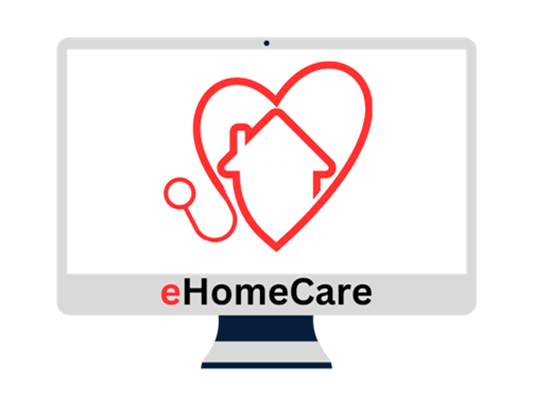
DSCC is proud to sponsor the expanded eHomeCare program to help families and home nurses improve their care knowledge and refresh their skills
We are excited to help expand a free online training program on how to care for children with complex medical needs at home.
Research shows that the number of children in need of medically complex care at home is steadily growing. With this growth, there is an urgent need for current and accessible educational resources to ensure the quality and safety of care for these children.
We’ve also heard from families and home nurses that they need a way to expand their knowledge about care in the home and refresh their skills.
The Division of Specialized Care for Children (DSCC) is proud to sponsor the expanded eHomeCare program to help meet this need and equip caregivers with the tools and knowledge necessary to provide high-quality care.
The eHomeCare program provides comprehensive, evidence-based information on the care of children with complex medical needs at home. The training is for:
- Family members and caregivers of children with complex medical needs
- Nurses working in home-based environments
- Physicians
- Respiratory therapists
- Students from health professions
- Anyone interested in learning more about caring for children with complex medical needs.
The eHomeCare program consists of eight on-demand courses to enhance the knowledge, skills and confidence of home care providers in the following areas:
- Caring for children with a tracheostomy with or without a ventilator
- Central line care
- Dialysis in home
- Infection control
- Setting boundaries in the home
- Skin care
- Range of motion
- Daily care activities for children
The courses aim to bridge knowledge gaps and enhance caregivers’ confidence and competence in managing both routine and emergency situations.
Please note that the completion of these training courses alone is not enough to demonstrate proficiency in skills that require specialized care (such as caring for a trach, ventilator or central line). If you are interested in becoming trained to provide these cares, please talk to your child’s medical team or home nursing agency.
Parents, extended family members, caregivers and others can use these modules to learn and refresh different skills for caring for their medically complex child in the home setting.
To learn more about the courses and enroll, visit the eHomeCare Online Training Program website.
After participating in the eHomeCare courses, individuals will be able to:
- Describe best practices for providing care and managing common issues for children requiring complex medical care at home.
- Recognize signs and symptoms of complications and determine appropriate responses when caring for children requiring complex medical care at home.
- Demonstrate enhanced confidence and competence in providing care for children requiring complex medical care at home.
- Collaborate effectively with healthcare team members to provide comprehensive and coordinated care for children requiring complex medical care at home.
Free continuing education credits are available.
If you have trouble enrolling in the course or need help, please email help@icep.wisc.edu.
The eHomeCare Program originally started as one course focused on trach and vent care through a partnership of several Wisconsin-based nursing schools and hospitals.
DSCC provided funding and collaboration to expand the eHomeCare training program in response to family feedback on the need for more education and training on caring for children with complex medical needs at home.
We partnered with the Illinois Department of Healthcare and Family Services (HFS) and the federal Centers for Medicare and Medicaid Services (CMS) to fund the project.
DSCC team members worked with eHomeCare developer Dr. Kim Whitmore and her team at Ujima United to add more courses to the training in collaboration with the Interprofessional Continuing Education Partnership at the University of Wisconsin-Madison.
We hope the expanded eHomeCare training modules will be a valuable resource for families, caregivers and everyone involved in their children’s complex care at home.
New Approval Process for Respite Nursing Services
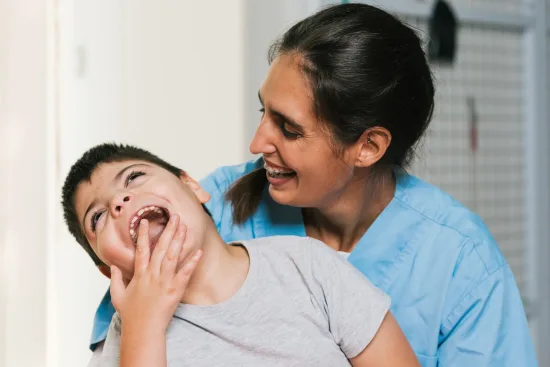
New approval process for respite care for individuals enrolled in the MFTD waiver begins on Sept. 1
Families enrolled in the Medicaid Home and Community-Based Services Waiver for Those Who Are Medically Fragile Technology Dependent (MFTD waiver) will see a new approval process for respite nursing services.
This change will help make respite nursing services more respectful of your wishes.
Starting Sept. 1, 2025, nursing agencies must get your permission and official approval from the Division of Specialized Care for Children (DSCC) before providing respite care to your child. This means a nursing agency or respite facility cannot use your respite hours unless you ask for them and agree to the plan.
Why This Change Is Important
We are making this change because families shared concerns that agencies and/or facilities used their respite care hours without their knowledge or permission. We want to make sure:
- You are always in control of when and how your family uses respite care.
- Respite services follow Medicaid and MFTD waiver rules.
- You know exactly how many respite hours are used and when.
What You Need to Know
- Each year, families in the MFTD waiver get 336 hours of respite care.
- Respite care is only available if the legally responsible adult (LRA) asks for it.
- Nursing agencies cannot use respite hours without your clear permission.
- If you request respite, the agency must fill out a form and get approval from DSCC before care begins.
- Respite hours don’t roll over to the next year and can’t be used as overtime.
If you think your child needs respite care, talk to your nursing agency about how many hours you want and when you need them. Please give them as much notice as possible (at least two business days before you need the care).
Your nursing agency will then contact DSCC to submit your request.
If something comes up at the end of the month and you need extra help, please talk with your nursing agency. They can work with you to request respite.
If you have any questions, please reach out to your DSCC Care Coordinator. They are here to support you through this process.
Thank you for your cooperation and partnership!
Celebrating 80 Years of the Institute for Parents of Preschool Children Who Are Deaf or Hard of Hearing
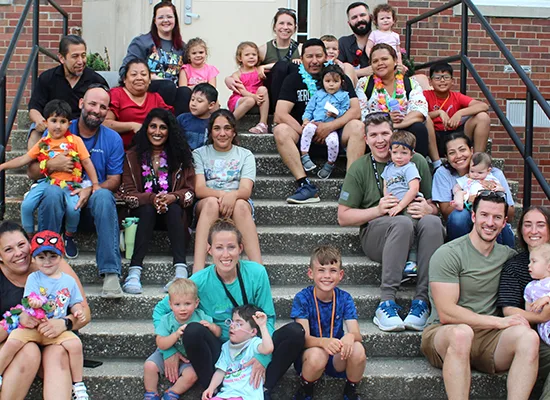
Nearly 20 Illinois families gained valuable knowledge, support and connection for raising a child with hearing loss during the annual Institute in June
June 10-14, 2025, marked 80 years of the Institute for Parents of Preschool Children Who Are Deaf or Hard of Hearing.
This free, annual program is for parents and caregivers of children ages 6 and under who have an identified hearing loss. It helps families learn, connect, and find support all in one place.
Since 1945, the Institute has welcomed families at the Illinois School for the Deaf (ISD) campus in Jacksonville. This year, 18 families from across the state found community and connection at this five-day program.
The Division of Specialized Care for Children (DSCC) helps support the Institute, along with other sponsors.
Support for the Whole Family

The Institute is more than a learning program for parents. It’s a family-friendly event where everyone can join in.
“It really is a valuable experience for everyone who comes,” said Angela Kuhn, director of the Institute and an administrator at ISD. “It’s an event that is inclusive of everyone in your family.”
Parents Rogelio and Lizeth came to the Institute with their 10-year-old son, Roger, and their 2-year-old daughter, Aliah. Aliah was born with Microtia, a condition that affects the shape of the ear and causes hearing loss.
Their family came to the Institute to learn how to best support her development.
“We have learned a lot, how to help my daughter and how to make us stronger, how to defend her, how to prepare her for the future,” shared Lizeth.
“My son Roger has been learning how to help his sister,” added Rogelio.
While Aliah was busy playing with her peers and receiving evaluations from professionals, Rogelio and Lizeth spent their time in workshops and lectures for parents. Roger joined the sibling program, where he took American Sign Language (ASL) lessons and made friends with other siblings of children who are deaf or hard of hearing.
By the end of the week, Roger had formed a close bond with other siblings in the program, including Michael (7), Neela (11), and Jezreel (12).
“I wasn’t expecting that…”

Michael came to the Institute with his mom, Brittany, and his younger siblings—Dominic (age 1) and Gianna (age 5). Gianna is profoundly deaf and has CHARGE syndrome, a rare genetic condition that affects multiple parts of the body.
At first, Michael wasn’t sure what to expect. “I expected that it wouldn’t really be that fun, I wouldn’t meet any kids to play with,” he said. “But I guess I did—and it was really fun.”
Michael and his new friends spent almost every moment together.
“He’s just like, ‘Hi, Mom. Bye, Mom.’ And I’m like, ‘Oh, okay, bye,” Brittany said with a smile.
“I wasn’t expecting that part to be so neat,” she said. “To see them as strangers on Tuesday and then to watch them eating lunch together, being inseparable, that was really cool.”
Extraordinary Connections

Institute and ISD preschool teacher Natalie Garver explained how attendees transform from strangers at the start to a close-knit family by the end.
“It’s so cool how we show up day one and everyone’s kind of looking around like, ‘Was this a good idea? This seems kind of awkward.’ By the last day of Parent Institute, it’s like, ‘Bye, we’re going to miss you. Like, let’s keep in touch, find me on Facebook,’” she described.
“When you share this kind of experience with other people, the connection you can make with families is just extraordinary in such a short amount of time.”
Natalie has taught children who are deaf or hard of hearing for 17 years. She has worked at the Institute for several of those years. Natalie is one of many returning team members who make the experience feel like home for families.
“The staff here does a really good job of making it almost a family setting and culture,” said Institute parent Brent.
Brent and his wife Rebecca are the proud parents of Cash, age 5. They live in Jacksonville where Cash, who uses cochlear implants, is a student at ISD.
“It’s our job as parents to stay informed and stay involved and keep learning,” Rebecca said. “The Parent Institute is perfect for that.”
“There’s a community for us and they’re closer than we think.”

While Cash and his family are locals, many families travel from all over Illinois to attend the Institute.
Cindi and her 2-year-old daughter, Luna, made the trip from the north side of Chicago. Luna is the first person in her family to be diagnosed with hearing loss.
“This is all brand new. I felt lost, like nobody around the neighborhood that I know of had children with hearing loss,” said Cindi.
“Coming here, I’ve connected with so many parents. I actually found a neighbor, not literally a neighbor, but she’s so close by that we take our kids to the same playground, and we never even noticed. So, it’s been great. There’s a community for us and they’re closer than we think.”
DSCC Family Liaison Violet Wiker, who helps families enroll in the Institute, emphasized the value of these new friendships and their lasting impact.
“I think it’s very wonderful when you walk around the cafeteria and you can hear the kids scream across the line asking mom if they can sit with their new friend…” Violet said.
“And then you see mom and dad making another friend at the lunch table, and they’re sharing experiences and they’re not even in the same location, but they found a friend that maybe they can take home with them and connect with later to say, ‘Hey, I’m feeling this sort of way,’ or’ Hey, do you have a suggestion here?’ And we built that network now.”
Looking Ahead

The 80th year of the institute was full of learning, laughter, and new friendships. Families left with more knowledge, stronger support systems, and lasting memories.
Tori Lynch, an Institute cadet, looks forward to the Institute’s bright future. “I have no doubt it’ll go on 80 more years.”
Find more memories from the 2025 Institute on our Facebook page in our 2025 recap album. You can also see videos that highlight different parts of the Institute experience on our YouTube playlist.
The following organizations supported the 2025 Institute:
- University of Illinois Chicago’s Division of Specialized Care for Children (DSCC)
- Department of Human Services – Division of Rehabilitation Services
- Illinois School for the Deaf
- Illinois State Board of Education
- Illinois Department of Public Health
- Ann & Robert H. Lurie Children’s Hospital of Chicago
For more information about the Institute and how DSCC supports children with hearing loss, call (800) 322-3722 or email dsccinstitute@uic.edu.
Inclusive Camps for All Ages Offer Fun, Friendships and New Adventures!

Check out our summer camp list to explore opportunities and find the right fit for your camper
Does your child want to make new friends? Develop new skills? Meet others with their condition or become more independent?
Head to our 2025 summer camp list. You’ll find accessible day, overnight and family camps across Illinois and beyond.
These programs welcome campers with a wide range of needs, abilities and many of our Core Program’s eligible medical conditions. The camps also cater to a wide range of interests, including:
- Learning to program and other computer skills
- Building independence and self-advocacy skills
- Exploring the great outdoors
- Cooking, art, drama and more
If you’re looking for the perfect camp opportunity, there are several ways to search on our website:
- Use the search box and filter option on our Events page to search for camps and other related keywords and locations
- View our 2025 summer camp list
- Use our Events Calendar view
Our list continues to grow, so check back often!
PLEASE NOTE: we share these opportunities for information purposes only. The Division of Specialized Care for Children (DSCC) does not manage or coordinate these camp opportunities or programs. If you have questions about a specific camp, please use the contact number or website we list for each program.
If you know of any summer camp opportunities we should add, please send us the details at dscc@uic.edu.
Here’s to a fantastic summer filled with smiles and new experiences!



